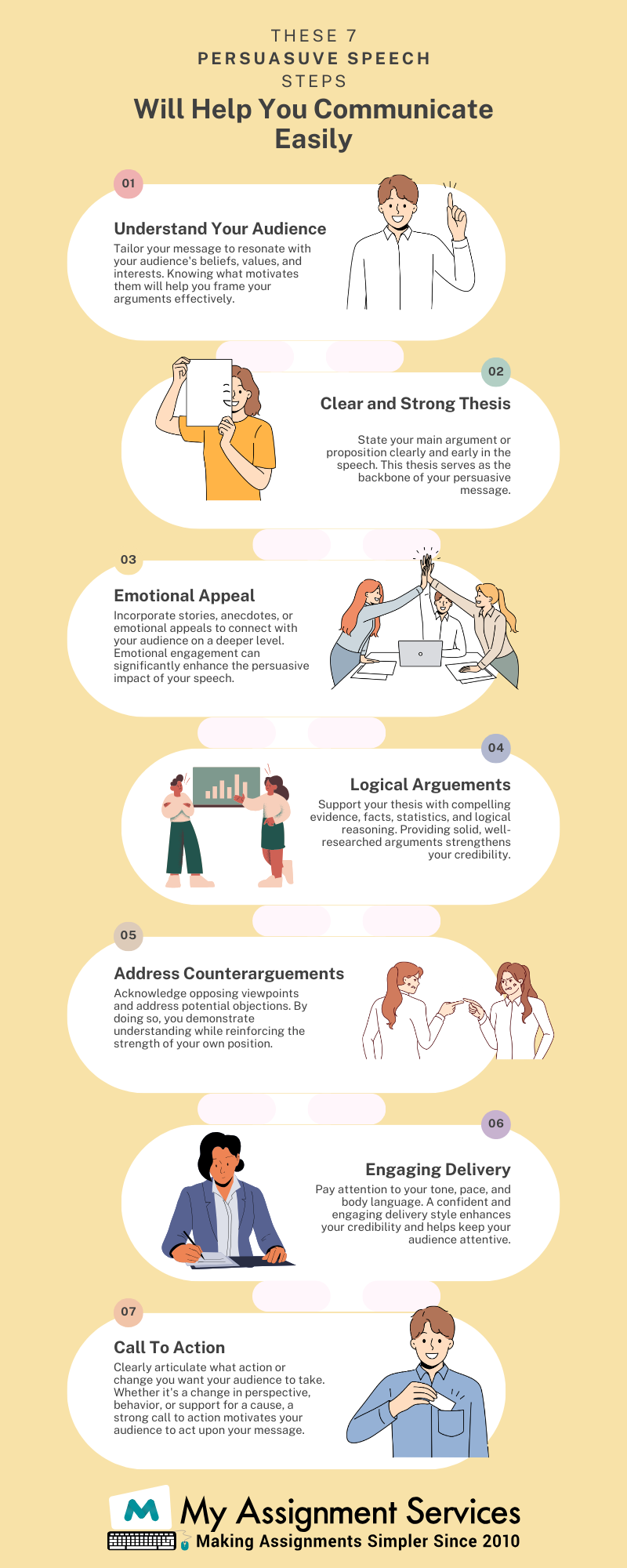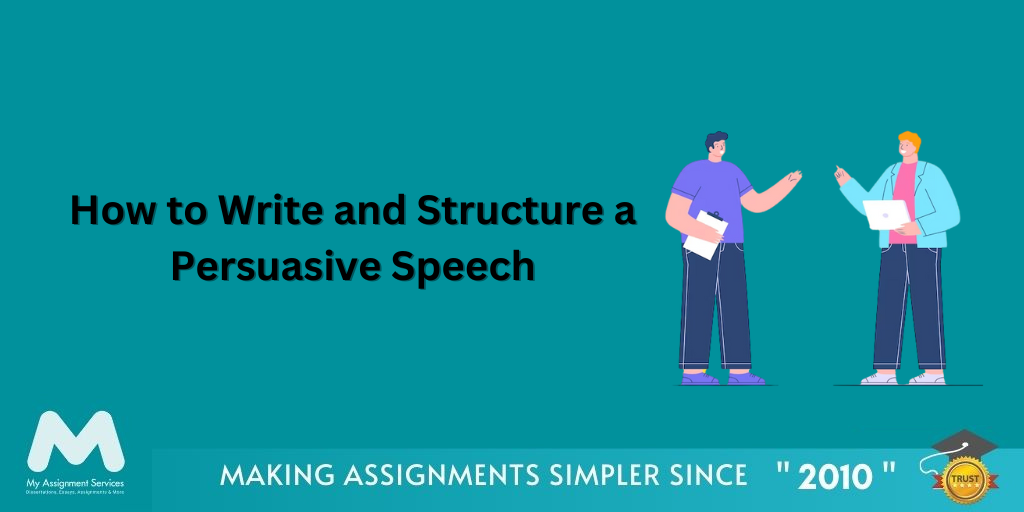Ready to transform your voice into a force that inspires, convinces and leads? Welcome to the art of persuasive speech writing, where words become your paintbrush and the world your canvas. In this blog, we will explore and learn the secrets behind crafting speeches that make people sit up, listen and take action.
Whether facing a university presentation or a debate showdown, these strategies and tips will equip you to construct speeches that leave a lasting impression. This will guide you through each step, from crafting attention-grabbing hooks to building rock-solid arguments to delivering a resonating finale. So, get ready to free the power of words and discover how to make your voice heard, your ideas accepted, and your message remembered.
What is Persuasive Speech?
A persuasive speech aims to sway the audience's viewpoint or prompt them to take specific actions. Through a combination of language and visuals, the speaker endeavours to shape the audience's thoughts and behaviours. In this form of communication, three rhetorical elements are employed in persuasive speech structure:
- Ethos: This refers to the speaker's credibility. Successful speakers establish their expertise on the subject, earning the audience's trust and attention.
- Pathos: Pathos involves appealing to the audience's emotions. Speakers use emotions like empathy or apprehension to connect and effectively persuade their audience.
- Logos: Logos highlight the speaker's use of logic and reasoning. They utilise evidence and examples to build a solid argument, demonstrating why their perspective is valid and convincing.
Why Learning Persuasive Speech is Essential for University Students?
Understanding why learning to persuade others is crucial for college students boils down to one thing: it's a game-changer. Mastering the art of convincing people isn't just about talking; it's about shaping opinions, presenting ideas convincingly, and leaving a lasting impression. Here's why persuasive speech skills are a must-have for students:
➢ Refined Communication
Learning to persuade helps you communicate better. It's about expressing your thoughts clearly, building strong arguments, and delivering your ideas so others really pay attention. This skill comes in handy during class discussions and later on in professional situations like interviews or presentations.
➢ Sharper Critical Thinking
Persuasive speaking also sharpens your thinking skills. You will get good at picking out important information, choosing the right facts, and making logical arguments. This skill isn't just for college—it helps you make smarter choices in life. Seek assistance from essay help online experts to get more clarity.
➢ Leadership and Impact
Persuasive speaking isn't just about talking; it's about leading. It boosts your confidence and helps you inspire others. That means you can champion causes you care about, like environmental or social causes, and make a difference.
➢ Advocating for Change
College is a time when you can support various causes. Being persuasive helps you advocate for what you believe in. Whether it's for a charity or a community initiative, you can get others involved and motivated.
➢ Preparation for Professional Life
Being persuasive is a big advantage once you are in the working world. It's especially useful in jobs where you must sell ideas or negotiate deals through your persuasive speech. So, learning this skill now sets you up for success later in your career.

Now that we know why persuasive speech is essential for university students let's get into details and get to know the proper formatted persuasive speech structure, aiming to inform, inspire, and encourage action for a better tomorrow:
➔ Introduction
- Attention Grabber: Start with a hook to captivate the audience's interest—a compelling story, a shocking statistic, a thought-provoking question, or a powerful quote related to your topic.
- Statement of Purpose: Clearly state the topic and your goal. Introduce your stance or the action you are advocating.
➔ Establish Credibility (Ethos)
- Share your qualifications, experience, or expertise related to the topic.
- Mention any research or evidence supporting your authority on the subject.
➔ Present Your Argument
- Main Points: Outline the key arguments or reasons supporting your viewpoint. Typically, aim for 2-4 main points to maintain clarity and focus.
- Supporting Evidence (Logos): Provide facts, statistics, examples, or expert opinions that validate each argument in persuasive speech. This reinforces the credibility of your claims.
➔ Appeal to Emotions (Pathos)
- Connect emotionally with the audience. Share personal anecdotes, emotional stories, or vivid imagery to evoke empathy, compassion, or concern related to your topic.
➔ Address Counterarguments
- Acknowledge potential opposing viewpoints or concerns. Refute or address these counterarguments logically and respectfully.
- Reinforce why your viewpoint remains stronger or more valid.
➔ Call to Action
- Clearly articulate the specific action or change you want your audience to take.
- Provide a compelling reason or benefit for them to act on your message.
➔ Conclusion
- Summary: Recap the main points you've discussed.
- Closing Statement: End your persuasive speech structure with a strong closing statement that reinforces your message and leaves a lasting impression on your audience.
- Closing Call to Action: Reiterate the call to action, emphasizing its importance again.
Tips to Write the Persuasive Speech Effectively
The last leg, to effectively sway opinions and spur change, consider these key elements when writing your persuasive speech. From understanding your audience to delivering a clear message, each step is crucial in building a persuasive case:
- Weave your persuasive speech to the audience's values, interests, and concerns. Understanding their perspective helps in crafting compelling arguments that resonate with them.
- Define a clear purpose for your speech and maintain a singular focus throughout. Ensure every point supports your central message.
- Start with a hook—an anecdote, a surprising fact, a relevant quote, or a powerful question to immediately grab the audience's attention.
- Establish your expertise or credibility on the topic early in the speech. Share relevant qualifications, experiences, or research to gain the audience's trust. Ask for assignment help in Australia if you need proper speech-writing guidance.
- Present strong arguments backed by credible evidence, statistics, examples, or expert opinions. This lends weight to your claims and bolsters your persuasion.
- Appeal to the audience's emotions by sharing relatable stories, as emotions can be powerful in persuading the audience.
- Acknowledge and dismantle opposing viewpoints logically, reinforcing why your perspective holds more weight.
- Summarise key points, restate the call to action, and end with a memorable closing statement that leaves a lasting impression.
- Practise your persuasive speech multiple times to refine your delivery, timing, and overall effectiveness, as receiving feedback can help polish your message.
Mastering the Art of Persuasion with My Assignment Services!
Mastering the art of persuasive speech isn't just a skill; it's a gateway to influence and impact. By communicating messages to audiences, structuring clear and engaging content, and infusing credibility and emotion, persuasive speaking becomes an accessible and powerful tool. While initially challenging, it's a skill that can be honed with practice and guidance.
So, if you are seeking to excel in your assignments or presentations, then My Assignment Services offers specially crafted assistance, helping you refine your persuasive communication skills and explore your potential to sway opinions and inspire action. Thus, accept the challenges, refine your techniques, and witness the transformation of your words into compelling instruments of change. Visit the website today for more information, and order now if you are ready to start with your assignments with experts' guidance.





